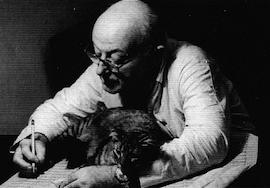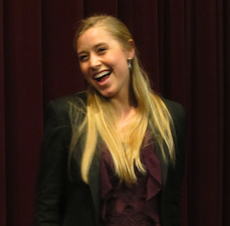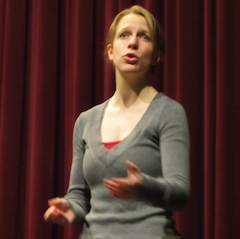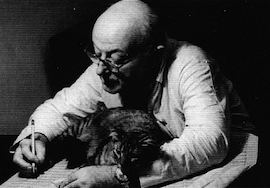
The Stanford University Department of Music’s Opera Workshop presents Henry Cowell's The Commission in a program "Opera-tions" that runs Feb. 23-March 23, in Dinkelspiel Auditorium.
Says mezzo Wendy Hillhouse, a faculty member, of the program, which includes two West Coast premieres:
I've been working on songs by Henry Cowell (1897-1965) for 20 years, and two years ago I found The Commission, a half-hour opera (he called it a symphonic cantata) in the Cowell collection at the New York Public Library. I've transcribed it from manuscript, and it will be performed by student singers and orchestra.
Other one-act operas in "Opera-tions" are Mozart's 1786 Der Schauspieldirektor (music in German, dialogue in English), about casting an opera; and Giancarlo Aquilanti's newly-composed piece First Night, about the audience.

Photos by Dominique White
As Hillhouse describes it, based on her research and biographies by Joel Sachs and Carol Oja, in the 1950s, Cowell and Colin McPhee were in their mid-fifties themselves, both struggling. Cowell and his wife Sidney were living in Shady, NY, about a hundred miles north of New York City; he was commuting to teach at Peabody Conservatory in Baltimore, and Manhattan's Columbia University and The New School.
McPhee was living in a single room in the lower west side of Manhattan. He was subject to depression and mood swings, drinking heavily and occasionally threatening suicide, trying to have his works performed, and writing a book about Balinese music. He used the Cowells’ home in Shady as a retreat, and visited so often that he kept his own cat there.
The two friends decided to write The Commission, and Cowell had received a commission from the League of Composers, eventually receiving a fee of $1,000, but whether the League intended The Commission to be its commission is unclear. What is certain is that the libretto that McPhee wrote is a personal commentary, full of wry humor and deeply heart-felt love of the art of composition, reflecting his own and Cowell’s point of view.

Each opera has its own stage director at the Stanford production: Hillhouse for the Cowell, Nova Jimenez for Mozart’s The Impresario, and Melissa Kagen for Aquilanti’s First Night. The Music Director is Marie-Louise Catsalis.
The Commission has had only one performance previous to this Stanford production. The premiere by the Overlook Lyric Theater took place in 1992, in Woodstock, NY. Also performed on the program that night were Larindo and Vanesio, a comic intermezzo by Johann Adolph Hasse, and A Little Nightmare Music by Peter Schickele alias P.D.Q. Bach.
For that performance Henry Bloch added an orchestration based on Cowell’s notes on his piano score. For the Stanford production, the orchestra is playing from a score transcribed from Bloch’s manuscript by Hillhouse, who added markings and instructions from Cowell’s piano score that were omitted by Bloch.
The Stanford performances are made possible by the cooperation of Richard Teitelbaum, musical executor for the Cowell estate, and Marlowe Hood, musical executor for the McPhee estate.
Aquilanti, from Italy, studied at the Conservatory of Music in Pesaro, California State University at Hayward, and completed a doctoral degree in Composition at Stanford in 1996. He is currently director of the Music Theory Program at Stanford. His First Night portrays a cast of characters who attend opera performances.
The spotlight is on three couples: Clara and Robert, an elderly married couple who have enjoyed opera since their second date; Arthur and Thomas, who share a tense moment as work commitments interfere with their love of opera; and finally Noelle, a young opera-lover introducing her date, Joe, to the opera for the first time.

